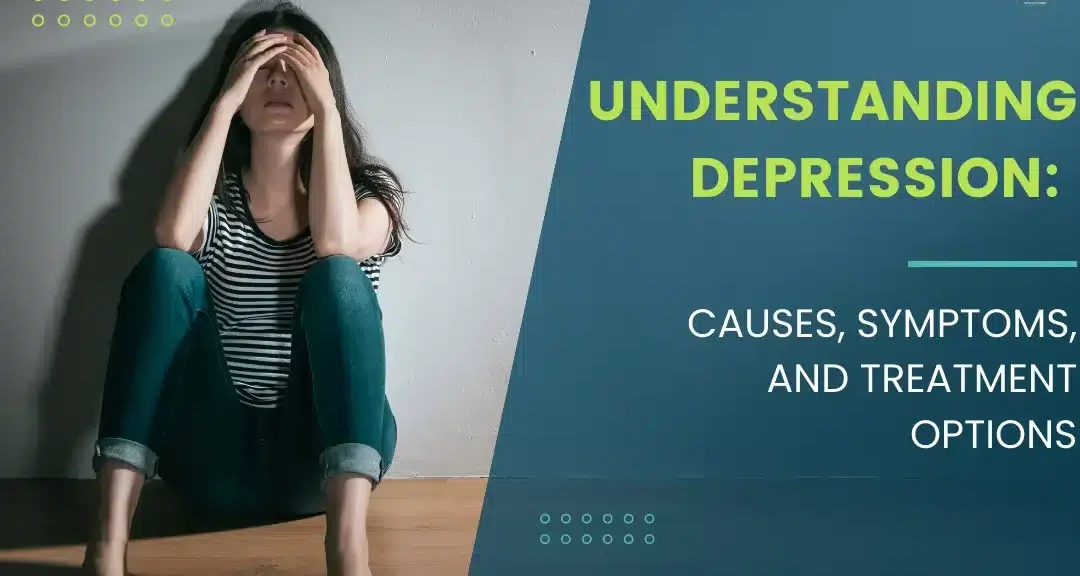Introduction to Depression: Understanding the Causes and Treatments
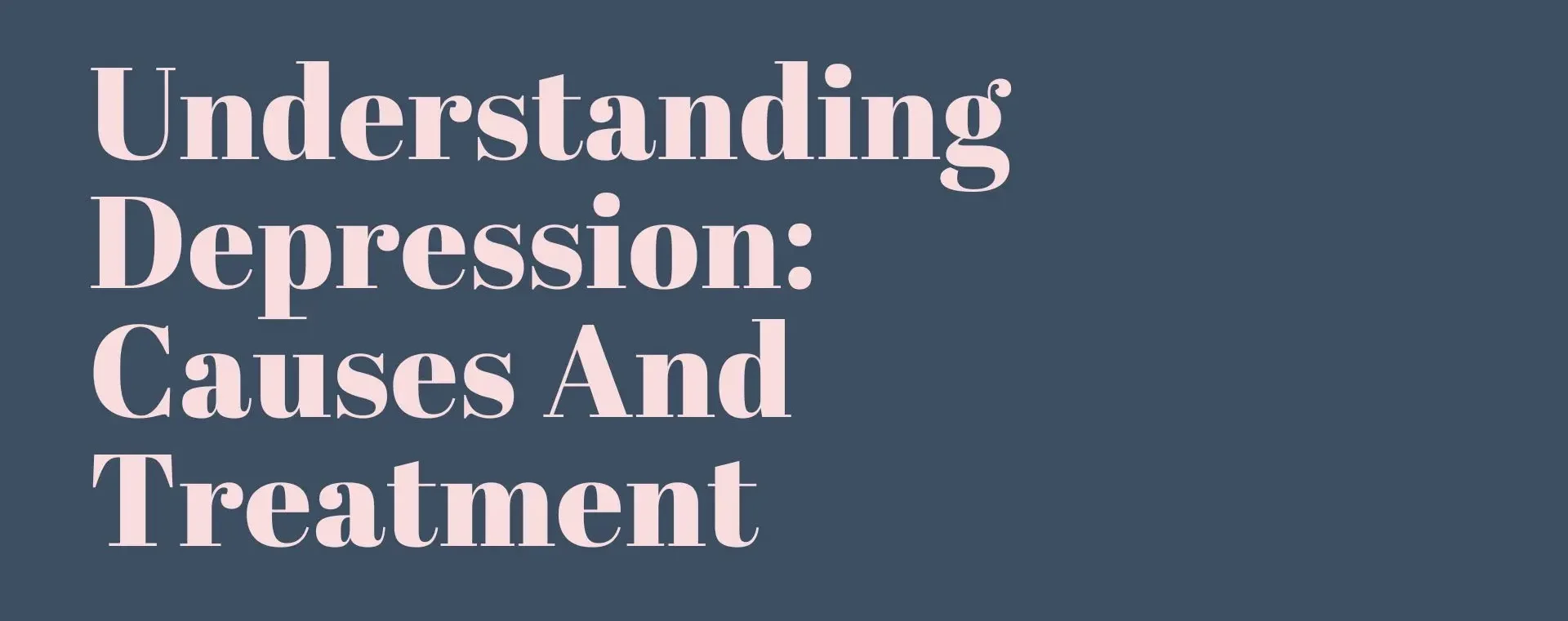
What is Depression?
Depression is a complex mental health condition characterized by persistent feelings of sadness, hopelessness, and a loss of interest or pleasure in activities. It affects how a person thinks, feels, and behaves and can interfere with daily functioning.
Importance of Depression: Understanding the Causes and Treatments
Understanding melancholy is important for several motives. Firstly, it facilitates people understand signs in themselves or others, main to early intervention and remedy. Secondly, it reduces stigma surrounding mental fitness troubles, encouraging open dialogue and help. Lastly, knowledge depression promotes empathy and compassion towards those experiencing it, fostering a supportive environment for recovery.
Scope of the Article
This article goals to provide an in-depth exploration of numerous varieties of melancholy, inclusive of their signs, reasons, and treatment options. By analyzing different kinds of melancholy, readers can advantage a complete know-how of this commonplace mental health condition and its effect on individuals’ lives.
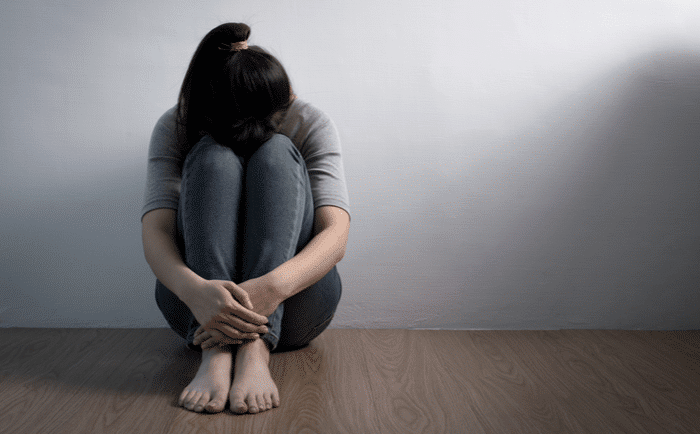
Types of Depression
Major Depressive Disorder (MDD)
MDD, also known as clinical melancholy, is the most not unusual form of despair. It includes chronic feelings of unhappiness, emptiness, or irritability, in conjunction with changes in sleep, appetite, and strength degrees. Symptoms ought to be gift for as a minimum two weeks to be diagnosed.
Persistent Depressive Disorder (PDD)
Formerly known as dysthymia, PDD is a chronic form of melancholy lasting for two years or more. Symptoms may be much less excessive than MDD however persist for a longer length, impacting daily functioning and basic first-class of existence.
Bipolar Disorder
Bipolar ailment is characterised via alternating episodes of despair and mania or hypomania. During depressive episodes, people enjoy signs similar to MDD, whilst manic or hypomanic episodes contain expanded mood, elevated power, and impulsive behavior.
Seasonal Affective Disorder (SAD)
SAD is a subtype of despair that happens seasonally, usually for the duration of the fall and iciness months while there is much less herbal daylight. Symptoms consist of low energy, oversleeping, weight gain, and a craving for carbohydrates. Light remedy and life-style changes are commonplace treatments.
Postpartum Depression
Postpartum melancholy happens in girls after childbirth, characterized by feelings of excessive sadness, tension, and exhaustion. Hormonal changes, sleep deprivation, and the strain of caring for a new child can make a contribution to its onset.
Psychotic Depression
Psychotic depression involves excessive depression accompanied by psychotic signs and symptoms which includes hallucinations or delusions. Individuals can also enjoy a damage from fact, making it crucial to are searching for instantaneous scientific attention.
Atypical Depression
Atypical depression is characterized by using temper reactivity, which means individuals enjoy an stepped forward temper in response to advantageous activities. Other symptoms may additionally include expanded appetite, weight gain, immoderate sleep, and sensitivity to rejection.
Situational Depression
Situational despair, also called adjustment disease with depressed mood, happens in response to a selected stressful event or situation, including a loss, relationship issues, or financial problems. Symptoms commonly clear up once the stressor is alleviated or coping mechanisms are carried out.
Understanding the Causes
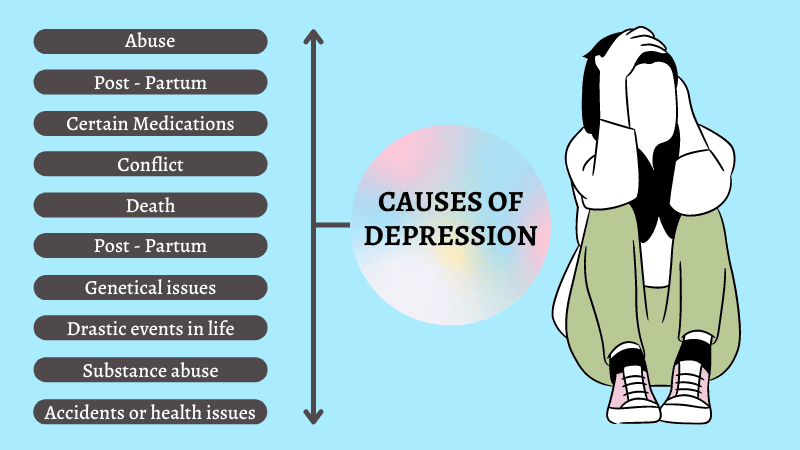
Biological Factors
Biological factors play a significant role in the development of depression. These include:
Genetics and Family History:
Research suggests that genetics can predispose individuals to despair. People with a own family records of despair are at a better hazard of experiencing it themselves. While specific genes connected to melancholy have been recognized, the interaction among genetic predisposition and environmental elements is complicated.
Brain Chemistry Imbalance:
Depression is associated with imbalances in neurotransmitters, the chemical messengers inside the mind chargeable for regulating mood, feelings, and conduct. Low levels of serotonin, dopamine, and norepinephrine had been implicated in depressive signs and symptoms. Medications that focus on these neurotransmitters, including selective serotonin reuptake inhibitors (SSRIs), are regularly used to treat despair.
Hormonal Changes:
Fluctuations in hormones, which includes for the duration of puberty, pregnancy, menstruation, or menopause, can have an effect on temper and increase the risk of developing depression. Hormonal imbalances may additionally disrupt neurotransmitter hobby and make a contribution to depressive signs and symptoms.
Environmental Factors
Environmental factors can trigger or exacerbate depression, including:
Trauma and Stressful Life Events:
Traumatic studies, such as abuse, lack of a loved one, or a good sized life alternate, can cause depression. Chronic stress, together with monetary troubles or paintings-related strain, also can make a contribution to the development of depressive symptoms.
Childhood Adversity:
Adverse reviews during childhood, inclusive of neglect, abuse, or parental separation, will have long-lasting results on intellectual fitness. Children uncovered to trauma are more likely to broaden despair later in lifestyles.
Chronic Illness or Pain:
Chronic medical situations, inclusive of cancer, diabetes, or chronic ache conditions like fibromyalgia, can growth the threat of melancholy. The strain of coping with a continual infection, along with physical soreness and boundaries, can make a contribution to depressive signs.
Substance Abuse:
Substance abuse, inclusive of alcohol, drugs, and prescription medicines, can both cause and worsen despair. Substance use disrupts brain chemistry and impairs judgment, growing vulnerability to mood problems.
Psychological Factors
Psychological factors can influence the development and course of depression, including:
Low Self-Esteem:
Individuals with low shallowness may additionally have a terrible self-photograph and emotions of worthlessness, which might be commonplace capabilities of despair. Low shallowness can also make contributions to a lack of motivation and problem handling demanding situations.
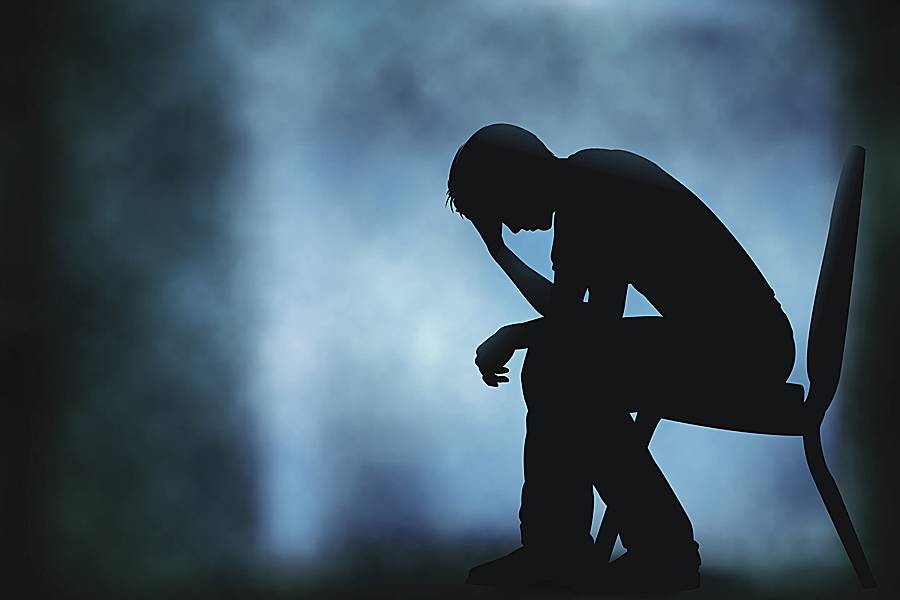
Negative Thinking Patterns:
Negative notion patterns, which include rumination (repetitive and intrusive mind about perceived problems) and cognitive distortions (irrational and exaggerated beliefs), are hallmark features of melancholy. These styles can perpetuate emotions of hopelessness and exacerbate depressive signs and symptoms.
Personality Traits:
Certain character trends, which includes perfectionism, pessimism, or an inclination to internalize emotions, can also increase the risk of growing despair. Additionally, people with avoidant or established personality patterns might also struggle to cope with stressors, contributing to the onset of depressive episodes.
Recognizing the Symptoms
Recognizing the symptoms of depression is crucial for early intervention and treatment. Symptoms can manifest in various domains, including emotional, physical, and cognitive aspects.
Emotional Symptoms:
Persistent Sadness or Hopelessness:
Individuals with melancholy regularly experience a pervasive experience of disappointment that persists for an prolonged length, typically lasting for 2 weeks or more. This disappointment may also sense overwhelming and unrelated to particular occasions or instances. Feelings of hopelessness, worthlessness, or melancholy may accompany the disappointment, making it tough to discover pleasure or meaning in lifestyles.
Loss of Interest or Pleasure:
A hallmark symptom of depression is anhedonia, or the incapacity to enjoy satisfaction or hobby in activities that were once enjoyable. Hobbies, social interactions, and other previously pleasing experiences may no longer evoke nice emotions. This lack of interest can contribute to emotions of vacancy and detachment from others.
Irritability:
While unhappiness is a outstanding emotional symptom of melancholy, a few individuals can also experience extended irritability or agitation. Minor frustrations or stressors may cause outbursts of anger or irritability, leading to conflicts in relationships or problem regulating feelings.
Physical Symptoms:
Changes in Appetite or Weight:
Depression can have an effect on appetite regulation, main to modifications in consuming habits and weight. Some individuals may also experience increased urge for food and weight gain, while others can also have a decreased appetite and accidental weight reduction. These adjustments may additionally make contributions to feelings of guilt or self-awareness.
Sleep Disturbances:
Sleep disturbances are commonplace in despair and might appear as insomnia (issue falling or staying asleep) or hypersomnia (immoderate sleepiness or extended sleep duration). Individuals with despair may additionally war to hold a ordinary sleep time table, leading to fatigue, daytime sleepiness, and impaired cognitive function.
Fatigue or Low Energy:
Feelings of fatigue, exhaustion, or low electricity are universal physical signs of depression. Even easy obligations might also sense overwhelming and exhausting, main to decreased productiveness and motivation. Fatigue may persist notwithstanding adequate rest and may intrude with daily functioning.
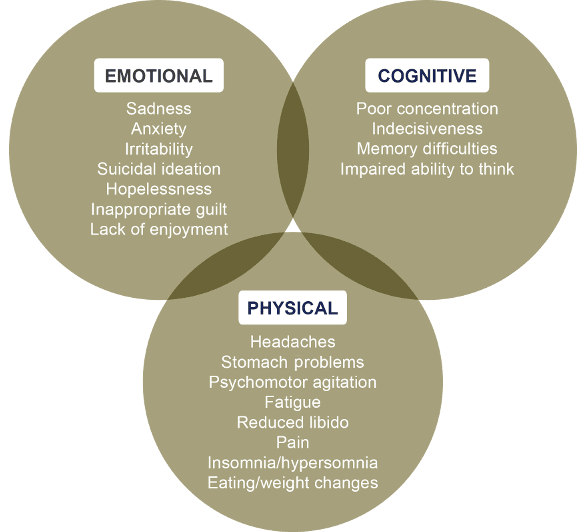
Cognitive Symptoms:
Difficulty Concentrating:
Depression can impair cognitive feature, making it difficult to awareness, pay attention, or be aware of obligations. Individuals may sense mentally foggy or locate it hard to maintain information, leading to instructional or occupational difficulties. This cognitive impairment can in addition exacerbate feelings of frustration and low shallowness.
Memory Problems:
Memory difficulties, which include forgetfulness or lapses in don’t forget, are common cognitive signs and symptoms of melancholy. Individuals might also have problem remembering latest activities, appointments, or important info, contributing to feelings of disorientation and frustration.
Indecisiveness:
Depression can interfere with choice-making techniques, leading to indecisiveness or hesitation whilst faced with picks. Even simple choices might also sense overwhelming, causing people to keep away from making picks altogether. This indecisiveness can perpetuate feelings of helplessness and exacerbate feelings of inadequacy.
Diagnosing Depression
Diagnosing depression is a critical step in effectively managing the condition and improving quality of life. Several factors contribute to the diagnostic process:
Importance of Seeking Professional Help:
Seeking expert help is crucial for accurate prognosis and suitable treatment of despair. Mental fitness experts, such as psychiatrists, psychologists, or certified therapists, are skilled to assess signs and symptoms, conduct comprehensive reviews, and increase tailor-made remedy plans. They also can offer help, guidance, and sources to people and their households.
Diagnostic Criteria (DSM-5):
The Diagnostic and Statistical Manual of Mental Disorders, Fifth Edition (DSM-5), published through the American Psychiatric Association, outlines criteria utilized by healthcare experts to diagnose depression. These criteria consist of experiencing a depressed temper or lack of interest or pride (anhedonia) for maximum of the day, almost every day, for at least two weeks, together with extra signs which include changes in appetite or weight, sleep disturbances, fatigue, difficulty concentrating, feelings of worthlessness or guilt, and suicidal mind or behaviors.
Screening Tools and Questionnaires:
Healthcare companies often use screening tools and questionnaires to evaluate depressive signs and severity. Commonly used screening equipment consist of the Patient Health Questionnaire-nine (PHQ-nine) and the Beck Depression Inventory (BDI). These exams assist clinicians compare the presence and severity of despair signs, music modifications over time, and monitor remedy development.
Role of Healthcare Providers:
Healthcare companies, including primary care physicians, psychiatrists, psychologists, and therapists, play a vital role in diagnosing and treating depression. They behavior thorough critiques, inclusive of scientific history, bodily exams, and mental checks, to rule out different clinical conditions and determine the underlying causes of depressive signs. Healthcare carriers also collaborate with individuals to increase personalised treatment plans, which can also consist of remedy, medicine, life-style modifications, and support offerings.
Effects of Depression
Depression can have profound effects on various aspects of an individual’s life, including:
Impact on Mental Health:
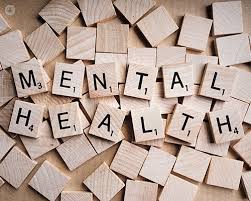
Depression appreciably influences mental fitness, main to continual feelings of sadness, hopelessness, and despair. It also can contribute to low self-esteem, terrible wondering styles, and impaired cognitive function, making it hard to concentrate, make choices, or revel in activities. Left untreated, depression can increase the risk of suicide and other intellectual fitness issues.
Relationship and Social Effects:
Depression can strain relationships with family members, friends, and romantic partners. Individuals with depression may withdraw from social interactions, experience difficulties communicating their needs, or exhibit irritability or moodiness, which can create tension and conflict in relationships. Social isolation and loneliness are common consequences of depression, further exacerbating feelings of loneliness and despair.
Occupational and Academic Consequences:
Depression can interfere with occupational functioning and academic performance. Individuals may struggle to concentrate, meet deadlines, or perform tasks effectively, leading to decreased productivity, absenteeism, or job loss. In academic settings, depression can impair learning, memory, and motivation, affecting grades, attendance, and overall academic achievement.
Physical Health Complications:
Depression is associated with diverse bodily fitness headaches, together with continual pain, cardiovascular ailment, diabetes, and immune system disorder. The pressure response prompted through depression can increase inflammation, weaken the immune system, and exacerbate current medical situations. Additionally, individuals with depression may interact in unhealthy behaviors, consisting of terrible food regimen, lack of workout, substance abuse, or self-damage, in addition compromising bodily health.
Risk Factors for Depression
Identifying risk factors for depression is essential for understanding who may be at higher risk of developing the condition. Several factors contribute to an increased vulnerability:
Age and Gender:
Depression can have an effect on people of any age, but sure age agencies may be extra prone. Adolescents and teenagers are at higher risk, probable due to hormonal changes, educational pressures, and social stressors. Additionally, gender performs a function, with women being more likely to revel in melancholy than men. Hormonal fluctuations, societal expectancies, and organic differences may additionally make contributions to this disparity.
Family History:
A own family records of depression will increase an character’s threat of growing the situation. Genetic factors can predispose individuals to despair, despite the fact that the proper genes worried are not fully understood. Environmental factors inside the family, together with exposure to parental melancholy or unfavorable early life experiences, may make a contribution to familial patterns of despair.
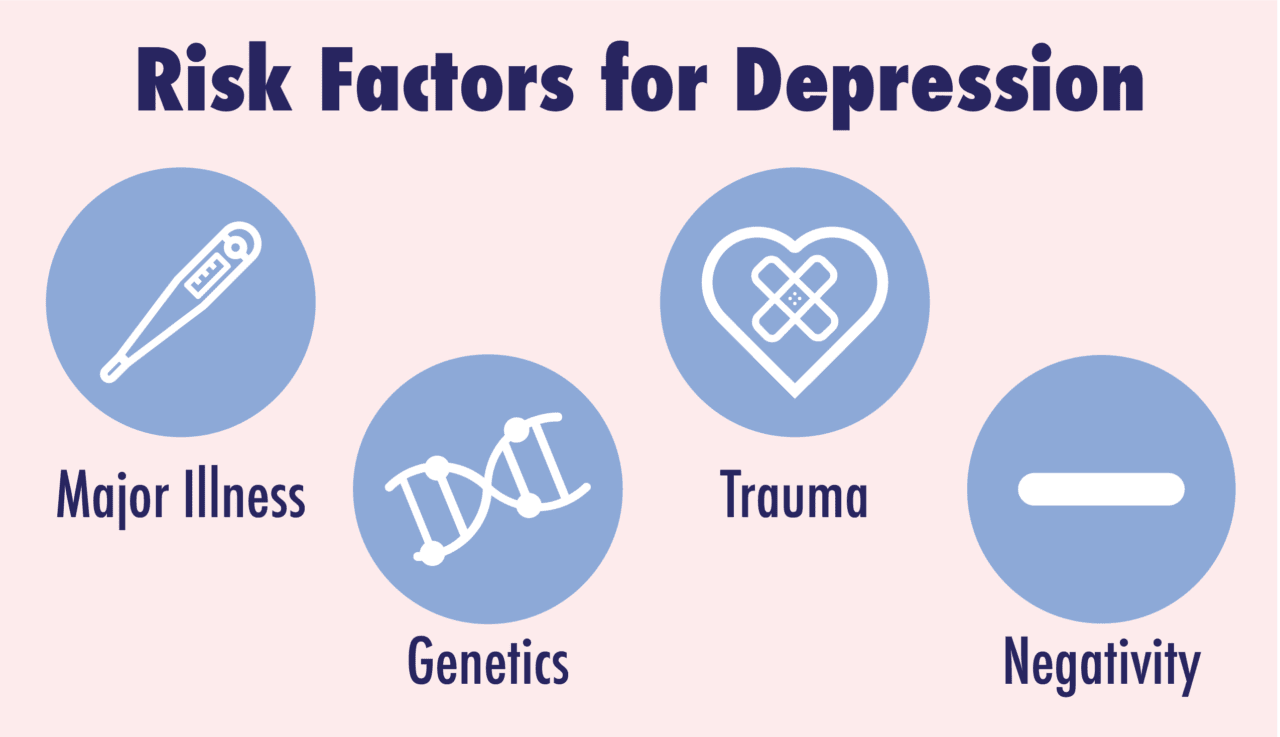
Trauma and Stressful Life Events:
Exposure to trauma and traumatic life occasions, including abuse, overlook, loss of a loved one, or economic problems, can trigger or exacerbate depression. These stories disrupt coping mechanisms, crush individuals’ capacity to evolve, and contribute to emotions of helplessness and depression. The cumulative effect of persistent stressors also can increase the threat of growing depression over the years.
Chronic Illnesses:
Chronic scientific conditions, such as most cancers, diabetes, autoimmune issues, and neurological disorders, are associated with an improved risk of depression. The bodily burden of infection, together with the emotional toll of coping with signs and symptoms, remedy side consequences, and life-style changes, can make a contribution to depressive signs and symptoms. Additionally, sure scientific conditions may directly affect brain chemistry and neurotransmitter feature, predisposing people to despair.
Substance Abuse:
Substance abuse, such as alcohol, illicit drugs, and prescription medicines, is strongly connected to melancholy. Substance use disrupts brain chemistry, impairs judgment, and exacerbates temper instability. Individuals might also use substances as a maladaptive coping mechanism to alleviate emotional distress, leading to a cycle of dependence and aggravating melancholy.
Prevention Strategies
Preventing depression involves adopting healthy lifestyle choices and implementing strategies to manage stress and support mental well-being:
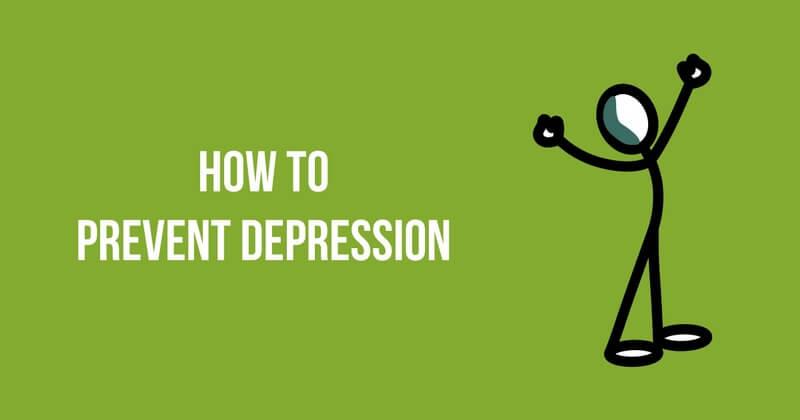
Healthy Lifestyle Choices:
Adopting a healthful lifestyle can sell mental resilience and decrease the danger of despair. This consists of prioritizing self-care, undertaking sports that carry joy and achievement, and maintaining a sense of motive and that means in life.
Regular Exercise:
Regular physical interest has been proven to have antidepressant outcomes via liberating endorphins, decreasing stress hormones, and improving mood and sleep first-rate. Aim for at the least 30 minutes of moderate-intensity exercising most days of the week, inclusive of brisk strolling, biking, or swimming.
Balanced Diet:
Eating a balanced diet wealthy in end result, greens, entire grains, lean proteins, and wholesome fats presents crucial vitamins for mind fitness and temper regulation. Limiting intake of processed foods, sugary snacks, and immoderate caffeine can assist stabilize strength stages and temper.
Sufficient Sleep:
Prioritize sleep hygiene with the aid of maintaining a normal sleep time table, creating a relaxing bedtime habitual, and growing a snug sleep surroundings. Aim for 7-9 hours of fine sleep according to night to assist premiere cognitive feature and emotional properly-being.
Stress Management Techniques:
Practice stress control techniques including mindfulness meditation, deep respiration physical games, progressive muscle relaxation, or yoga to lessen physiological arousal and promote rest. These strategies can help construct resilience to pressure and save you its terrible effect on intellectual health.
Building Strong Social Support:
Cultivate supportive relationships with circle of relatives, friends, and friends who offer emotional validation, realistic help, and social connection. Social help buffers towards the outcomes of stress and adversity, enhancing coping assets and fostering a sense of belonging and popularity.
Early Intervention and Treatment:
Recognize the early signs and symptoms of depression and are seeking for expert assist if signs persist or get worse. Early intervention and treatment can prevent the progression of depression and mitigate its impact on day by day functioning and standard properly-being. Therapy, medicinal drug, and assist agencies are powerful remedy alternatives for coping with despair and promoting restoration.
IX. Available Treatments
Various treatments are available for managing depression, ranging from psychotherapy and medications to alternative and complementary therapies:
Psychotherapy:
Psychotherapy, additionally referred to as communicate remedy, involves operating with a educated therapist to discover and cope with emotional, behavioral, and interpersonal troubles. Several forms of psychotherapy are powerful for depression:
Cognitive-Behavioral Therapy (CBT): CBT helps individuals discover and assignment terrible thought styles and behaviors contributing to despair. It teaches sensible talents to address stress, improve problem-solving skills, and alternate maladaptive thinking.
Interpersonal Therapy (IPT): IPT specializes in enhancing interpersonal relationships and communique abilties to relieve depressive signs and symptoms. It addresses precise interpersonal issues, which includes grief, role transitions, interpersonal disputes, and social isolation.
Psychodynamic Therapy: Psychodynamic therapy explores subconscious conflicts and unresolved problems from childhood which could contribute to melancholy. It aims to growth self-cognizance, perception, and emotional processing to facilitate recovery and private boom.

Medications:
Medications are frequently used to deal with despair, both on my own or in mixture with psychotherapy. Commonly prescribed medicinal drugs include:
Antidepressants: Antidepressants, which include selective serotonin reuptake inhibitors (SSRIs), serotonin-norepinephrine reuptake inhibitors (SNRIs), tricyclic antidepressants (TCAs), and monoamine oxidase inhibitors (MAOIs), assist alter neurotransmitter degrees in the brain to enhance mood and decrease depressive signs.
Mood Stabilizers: Mood stabilizers, along with lithium or lamotrigine, are used to treat bipolar disorder and stabilize mood fluctuations associated with depression and mania.
Antipsychotics: Antipsychotic medicinal drugs can be prescribed to individuals with intense depression or psychotic signs, along with hallucinations or delusions, to relieve symptoms and enhance universal functioning.
Alternative and Complementary Therapies:
In addition to traditional treatments, alternative and complementary therapies may offer adjunctive benefits for managing depression:
Exercise Therapy: Regular bodily pastime, such as aerobic workout, strength education, or yoga, has been shown to improve temper, reduce stress, and beautify standard properly-being. Exercise releases endorphins, neurotransmitters that promote emotions of pleasure and relaxation.
Yoga and Meditation: Mind-body practices, together with yoga, mindfulness meditation, and tai chi, promote relaxation, strain reduction, and emotional regulation. These practices boom self-attention, cultivate present-second recognition, and foster a sense of calm and inner peace.
Acupuncture: Acupuncture involves inserting skinny needles into specific factors at the frame to restore balance and promote restoration. Some studies advise that acupuncture may also help alleviate depressive signs through modulating neurotransmitter interest and lowering pressure hormone stages.
Herbal Supplements: Certain natural dietary supplements, which includes St. John’s wort, omega-3 fatty acids, and S-adenosylmethionine (SAMe), were studied for his or her capacity antidepressant consequences. However, it is important to discuss with a healthcare provider before the usage of natural supplements, as they may have interaction with medicinal drugs or have damaging results.
Lifestyle Changes to Manage Depression
In addition to professional treatments, lifestyle changes can play a significant role in managing depression and promoting overall well-being:
Establishing a Routine: Establishing a daily recurring can provide shape, balance, and a experience of purpose, which might be crucial for dealing with despair. Set regular wake-up and bedtime exercises, schedule food and sports, and prioritize self-care practices, which includes grooming, exercising, and relaxation.
Setting Realistic Goals: Break down obligations and duties into smaller, plausible dreams to keep away from feeling overwhelmed. Set sensible expectations for your self and rejoice small achievements along the manner. Focus on development in place of perfection, and be kind and compassionate to yourself.
Engaging in Pleasurable Activities: Make time for activities and pastimes that convey joy, pleasure, and a experience of success. Engage in activities that sell creativity, relaxation, and social connection, which includes artwork, song, gardening, or spending time in nature. Cultivate a sense of reason and that means on your each day lifestyles.
Avoiding Alcohol and Drug Use: Limit alcohol intake and avoid leisure drug use, as they can exacerbate depressive signs, impair judgment, and intrude with treatment effectiveness. Substance abuse can also boom the risk of addiction, mood instability, and negative results on bodily and intellectual fitness.
Practicing Relaxation Techniques: Incorporate rest techniques into your daily routine to lessen pressure, anxiety, and tension. Practice deep respiration physical games, innovative muscle rest, guided imagery, or mindfulness meditation to sell relaxation, improve mood, and beautify usual properly-being.
Support Systems and Resources
Support systems and resources play a crucial role in providing assistance and guidance to individuals experiencing depression:
Support Groups and Peer Counseling: Support businesses offer a secure and nonjudgmental area for individuals with melancholy to share experiences, receive emotional assist, and learn coping strategies from others dealing with comparable demanding situations. Peer counseling entails skilled volunteers or people with lived revel in supplying assist and encouragement to those in want.
Online Communities and Forums: Online groups and forums provide handy structures for individuals to connect to others, percentage resources, and alternate records about despair. These digital spaces offer anonymity and convenience, permitting people to are searching for support and advice from the comfort in their homes.
Helplines and Crisis Intervention Services: Helplines and crisis intervention offerings provide on the spot assistance and emotional guide to individuals in distress. Trained experts and volunteers provide personal counseling, crisis intervention, and referrals to mental fitness resources. These services are to be had 24/7 and can be accessed through telephone, text, or online chat.
Educational Materials and Books: Educational materials, books, and on-line assets offer valuable records and insights into melancholy, its signs, causes, and remedy alternatives. These sources empower people to better apprehend their condition, make knowledgeable selections about their care, and get admission to relevant guide offerings.
Coping Strategies for Loved Ones
Supporting a loved one with depression requires understanding, patience, and empathy. Here are some coping strategies for loved ones:
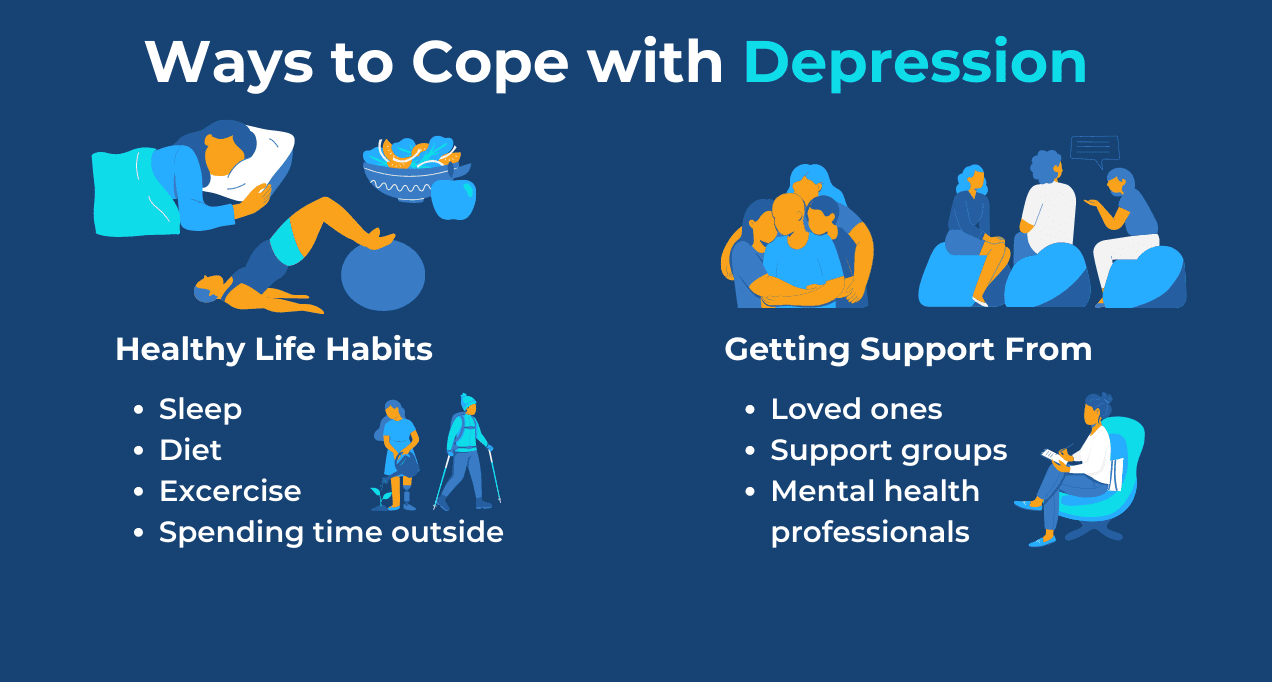
Educating Yourself about Depression: Educate yourself about despair to higher recognize its signs, causes, and treatment alternatives. Learning approximately the circumstance can assist dispel myths, reduce stigma, and provide insight into the one you love’s stories and wishes.
Providing Emotional Support: Offer unconditional love, empathy, and reputation to the one you love with melancholy. Listen actively, validate their emotions, and provide reassurance that they’re not alone. Be patient, nonjudgmental, and supportive as they navigate their journey closer to recovery.
Encouraging Treatment Adherence: Encourage your beloved to are trying to find professional assist and adhere to their treatment plan, which can also consist of therapy, medicinal drug, life-style modifications, and assist offerings. Offer assistance with scheduling appointments, attending remedy periods, and managing medicinal drug regimens.
Taking Care of Yourself: Prioritize your personal self-care and nicely-being whilst helping a cherished one with depression. Set boundaries, are searching for assist from buddies and circle of relatives, and have interaction in activities that fill up your energy and decrease pressure. Remember which you cannot pour from an empty cup, and it’s ok to seek assist for yourself if wanted.
Breaking the Stigma Surrounding Depression
Breaking the stigma surrounding depression is essential for fostering understanding, compassion, and support for individuals affected by the condition:
Challenging Misconceptions: Challenge stereotypes, myths, and misconceptions about depression by way of sharing accurate information, correcting misinformation, and selling empathy and understanding. Challenge language that stigmatizes intellectual contamination and perpetuates dangerous stereotypes.
Promoting Open Discussions: Create secure and inclusive spaces for open discussions approximately melancholy, intellectual health, and emotional well-being. Encourage communicate, active listening, and mutual aid amongst people, households, groups, and workplaces.
Advocacy and Awareness Campaigns: Support advocacy efforts and recognition campaigns aimed at selling mental fitness training, lowering stigma, and improving get right of entry to to intellectual fitness care. Advocate for coverage changes, investment for mental health services, and tasks that prioritize intellectual fitness and well-being.
Sharing Personal Stories: Share private stories and lived studies of depression to humanize the situation, encourage wish, and decrease feelings of disgrace and isolation. Personal narratives can empower people to are seeking assist, connect to others, and mission stigma through storytelling and shared experiences.
XIV. Frequently Asked Questions (FAQs)
What are the common symptoms of depression? Common symptoms of depression include persistent feelings of sadness or emptiness, loss of interest or pleasure in activities once enjoyed, changes in appetite or weight, sleep disturbances, fatigue or low energy, difficulty concentrating or making decisions, feelings of worthlessness or guilt, and thoughts of death or suicide.
Can depression be cured completely? While depression may not always be cured completely, it can often be effectively managed with proper treatment. Treatment options include therapy, medication, lifestyle changes, and support from healthcare professionals and loved ones. Many individuals with depression experience significant improvement in symptoms and quality of life with appropriate care.
How can I help a loved one who is suffering from depression? You can help a loved one with depression by offering support, empathy, and encouragement. Listen actively, validate their feelings, and offer assistance with practical tasks. Encourage them to seek professional help, adhere to their treatment plan, and engage in self-care activities. Be patient, nonjudgmental, and supportive as they navigate their journey toward recovery.
Are there any natural remedies for depression? Some natural remedies, such as regular exercise, mindfulness meditation, yoga, and herbal supplements like St. John’s wort, may help alleviate symptoms of depression for some individuals. However, it’s essential to consult with a healthcare professional before trying natural remedies, as they may interact with medications or have adverse effects.
What role do genetics play in depression? Genetics can play a significant role in predisposing individuals to depression. Research suggests that certain genetic factors may increase susceptibility to depression by influencing neurotransmitter function, stress response, and brain structure. However, genetics alone do not determine the development of depression, and environmental factors also play a crucial role.
Is depression more common in certain demographics? Depression can affect individuals of any age, gender, ethnicity, or socioeconomic background. However, research suggests that certain demographics, such as women, adolescents, and individuals with a family history of depression, may be at higher risk. Environmental factors, life experiences, and access to resources also contribute to variations in depression prevalence among different demographics.
Can depression affect physical health? Yes, depression can affect physical health in various ways. Chronic stress associated with depression can weaken the immune system, increase inflammation, and exacerbate existing medical conditions. Additionally, depression is associated with an increased risk of cardiovascular disease, diabetes, obesity, and other physical health complications.
How do I know if I need professional help for my depression? You may need professional help for depression if you experience persistent or worsening symptoms that interfere with your daily functioning, relationships, or quality of life. If you have thoughts of suicide or self-harm, it’s crucial to seek immediate help from a healthcare professional or emergency services. A mental health assessment by a qualified professional can determine the appropriate course of treatment for your specific needs.
What are the differences between depression and sadness? Depression is a clinical mental health condition characterized by persistent feelings of sadness, hopelessness, and a loss of interest or pleasure in activities. Sadness, on the other hand, is a normal human emotion that arises in response to specific events or circumstances and typically resolves with time. While sadness is a common symptom of depression, depression involves a constellation of symptoms that persist over an extended period and significantly impair functioning.
Are there any long-term consequences of untreated depression? Untreated depression can have significant long-term consequences on physical, emotional, and social well-being. Chronic depression increases the risk of developing other mental health disorders, such as anxiety, substance abuse, and suicidal thoughts or behaviors. It can also lead to impaired cognitive function, relationship difficulties, occupational problems, and an increased risk of medical conditions such as heart disease and diabetes. Seeking timely treatment for depression is essential for minimizing the potential long-term effects and improving overall quality of life.
Conclusion
In conclusion, understanding depression and seeking help are essential steps towards managing the condition and improving overall well-being. Let’s recap the key points discussed:
Recap of Key Points: Throughout this dialogue, we’ve blanketed numerous factors of despair, inclusive of its definition, kinds, reasons, symptoms, analysis, remedies, help structures, and approaches to task stigma. We’ve explored the multifaceted nature of depression, recognizing its biological, mental, and environmental elements. We’ve additionally highlighted the significance of early intervention, comprehensive remedy, and ongoing aid for individuals stricken by depression.
Importance of Seeking Help: Seeking assist for melancholy is critical for several motives. First and most important, depression is a treatable scientific situation, and professional assistance is available to alleviate symptoms and improve best of life. By seeking assist from healthcare experts, individuals can acquire an accurate prognosis, personalized remedy plan, and ongoing aid tailored to their needs. Additionally, searching for assist reduces the hazard of complications, together with worsening symptoms, impaired functioning, and multiplied risk of different mental and physical fitness troubles. It’s essential to recognize that reaching out for assistance is a sign of energy, not weakness, and that aid is available for those who need it.
Empowerment through Understanding and Treatment:Empowerment comes thru knowledge and taking proactive steps in the direction of managing despair. By learning about melancholy, its signs, causes, and treatment alternatives, individuals can benefit insight into their situation and make knowledgeable choices approximately their care. Understanding that melancholy is a medical circumstance, not a non-public failure, can lessen self-blame and stigma and sell self-compassion and reputation. Through treatment, people can regain a sense of manage over their lives, improve coping competencies, and paintings toward recuperation and properly-being. Empowerment also comes from in search of aid from cherished ones, participating in therapy, accomplishing self-care activities, and advocating for intellectual fitness recognition and resources in their communities.
In conclusion, depression is a complex and challenging condition, but with proper understanding, support, and treatment, individuals can overcome its obstacles and lead fulfilling lives. Seeking help is the first step towards empowerment and recovery, and no one has to face depression alone. By working together to challenge stigma, promote awareness, and provide support, we can
Depression: Understanding the Causes and Treatments Depression: Understanding the Causes and Treatments Depression: Understanding the Causes and Treatments Depression: Understanding the Causes and Treatments Depression: Understanding the Causes and Treatments Depression: Understanding the Causes and Treatments Depression: Understanding the Causes and Treatments Depression: Understanding the Causes and Treatments Depression: Understanding the Causes and Treatments Depression: Understanding the Causes and Treatments Depression: Understanding the Causes and Treatments Depression: Understanding the Causes and Treatments Depression: Understanding the Causes and Treatments Depression: Understanding the Causes and Treatments Depression: Understanding the Causes and Treatments Depression: Understanding the Causes and Treatments Depression: Understanding the Causes and Treatments Depression: Understanding the Causes and Treatments Depression: Understanding the Causes and Treatments Depression: Understanding the Causes and Treatments
Depression: Understanding the Causes and Treatments Depression: Understanding the Causes and Treatments Depression: Understanding the Causes and Treatments Depression: Understanding the Causes and Treatments Depression: Understanding the Causes and Treatments Depression: Understanding the Causes and Treatments</div hidden>

